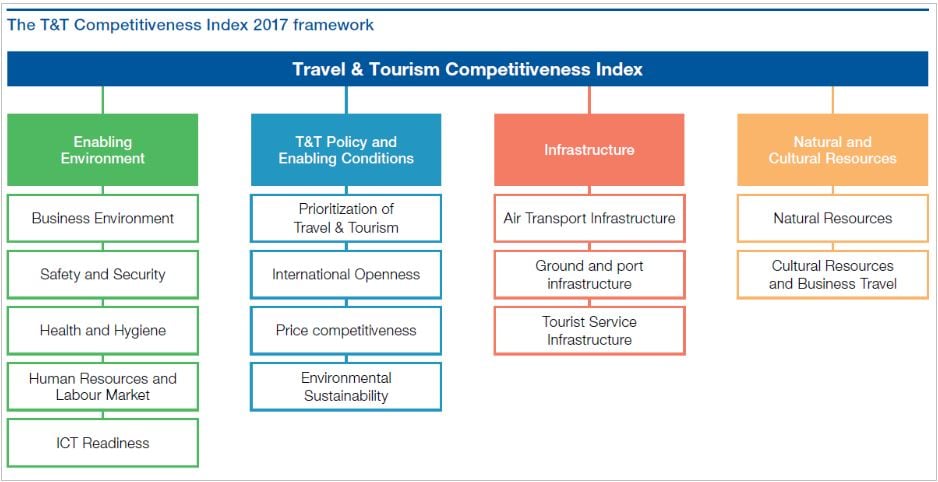Every two years, the World Economic Forum publishes its Travel & Tourism Competitiveness Index (TCCI), which benchmarks the travel and tourism competitiveness of 136 countries. The TCCI ranks countries based on four main sub-indexes and 90 individual indicators spread among 14 issue pillars.
The TCCI pointed to four key findings that emerged from their global reporting:
1. Travel and tourism competitiveness is increasing, especially in developing countries with Asia-Pacific countries particularly growing steadily.
2. Many countries are adopting less restrictive visa policies, thus stimulating increased travel.
3. Digital connectivity continues to expand and facilitate increased travel.
The most recent report should be of concern for hoteliers with properties across the country. Not only did the U.S. drop two places in the most recent Index from the previous rankings, the Index is another signal of potential trouble ahead for inbound tourism.

The travel ban has certainly dampened near-term demand for travel to the States: ForwardKeys, a Spain-based consultancy that monitors global air bookings, cited an overall net drop of 6.5 percent in international bookings to the U.S. However, the TCCI highlights some deeper causes for concern for U.S. inbound tourism, which—if not addressed—will pull the country in the opposite direction from the Trumpian mantra of “Make America First.”
The Good News
First, some good news in regards to the U.S.: It still ranks among the top 20 for offering a very business-friendly environment (16th), strong ICT readiness (19th) and qualified human resources (13th), as well as some of the world’s best air connectivity (2nd) and tourist service infrastructure (3rd), which enable access to great natural (10th) and cultural (13th) resources. In fact, for the business environment, the US ranks 18th for the efficiency of the legal framework in challenging regulations, 14th for the time required to obtain construction permits, and 6th for overall market dominance.
There are many other positives, such as the country's top rankings for access to improved sanitation, presence of car rental companies, number of sports stadiums, and number of international association meetings.
The Bad News
The drags on competitiveness cited in the Index are causes for concern. Although the business environment ranks as one of the best, the total tax rate ranks the US at 93rd, but other countries such as Sweden and Australia rank even lower. The business costs of terrorism and index of terrorism incidence put the U.S. respectively at 103rd and 114th. The latter is a bit odd considering that, according to the National Consortium for the Study of Terrorism and Responses to Terrorism (START), a center supported by the US Department of Homeland Security, 80 Americans were killed in terrorist attacks from 2004 to 2013 internationally, 36 were killed in attacks that occurred in the United States. It could be that they are referring to mass shootings and gun violence in general; the Gun Violence Archive reports over 15,000 incidents and nearly 4000 deaths already in 2017.
Visa requirements are now putting the U.S. at 122nd–the welcome mat is now not as visible as in past years. Equally concerning are the rankings now for environmental sustainability–areas where hotel companies such as Radisson, Hilton, Marriott and many others are excelling. Overall, however, the US now ranks at 115th for sustainability with environmental treaty ratification at 132nd, threatened species 119th, and percentage change of forest cover at 109th.
As the sixth-most competitive tourism destination, the ranking is still impressive. However, as the wealthiest country in the world, the resources exist for “America First” on most of the TCCI travel and tourism indicators.
